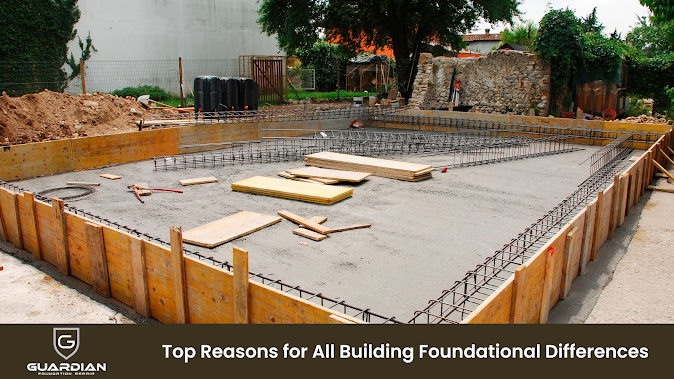Top Reasons for All Building Foundational Differences
Whether it's a residential home, commercial building, or any other structure, the foundation is the most critical part of the building. It must be strong enough to support the structure's weight and hold up in different environmental conditions. Plus, for any homeowner or contractor considering a foundation repair project, it's important to determine the right foundation for the building.
Different foundations, such as concrete slabs and pier-and-beam foundation systems, are best suited to specific types of soil and building loads. So, it's essential to be aware of each kind of foundation. Let's reason out why you need to know about factors affecting foundational differences that ultimately determine the best repair options for your project:
Factors Affecting Foundation Solutions for Different Building Types
Factors such as soil type, groundwater levels, and building load will play an important role in determining the best foundation solution. Let's have a deep look into each factor:
Climate Conditions
Climatic conditions influence foundation repair choices, with concrete slabs preferred for cold climates and pier-and-beam foundations better suited to warm climates. The concrete slab foundation repair protects underground pipes from freezing, while the pier-and-beam foundations offer more flexibility. It's best to rely on your foundation repair professional to help decide which solution is ideal for your climate so that your structure can withstand the test of time.
Location Differences
The location of your building matters when choosing a foundation. Slab foundations work best when the ground is level and there's less risk of soil erosion. Pier and beam foundations are the best options if your building is constructed on or near a slope. They provide stability even in areas prone to flooding as they are elevated from the ground. Thus, it's essential to know the geography of your area when choosing a foundation solution for your building.
Soil Type and Condition
Several factors can cause foundation problems, but the most common culprits are soil type and condition. Different types of soils have different properties, which can affect the strength and longevity of a building's foundation. Pier and beam foundations are best suited for Knoxville and Houston areas with loose or sandy soil, as they are less likely to sink, settle, and be affected by erosion. Plus, concrete slabs work well on firm-level grounds. Before starting any foundation repair project, it's essential to determine your site's soil type and condition.
Groundwater Levels
Your foundation repair Knoxville professionals will also consider the water level when selecting a foundation system. The water level below the land is known as the water table. The higher the water table, the more prone the foundation is to damage due to moisture accumulation and erosion. It's essential to check with your contractor regarding the concrete slab and pier-and-beam foundation's water resistance factors before you begin the repair project.
Building Loads
Depending on the type of structure and load, foundation solutions can vary. The load from a building with a different number of floors, materials used, and environmental factors play an important role. It is essential to consider the bearing capacity of a structure, wind load, and other environmental factors when selecting the best solution for your building's foundation.
Structural Considerations
Homeowners deciding on a house foundation repair should consider the structure itself, including how it will be used and the materials that make up the building. Structural load, building location, soil type, condition, and climate all play an important role in deciding which foundation system is best for the project. The type of foundation chosen should be based on the building's life span, height, number of floors, and any other factors that may influence its durability. After assessing all these factors, the homeowner can determine which system best suits their needs and budget and help ensure the building will remain structurally sound for years to come.
Related Read: Most Common House Foundation Types with Pros & Cons.
Final Verdict
Selecting the right foundation for your project is a complex process. It is essential to evaluate all the above factors and consult an experienced foundation repair contractor to ensure your building is properly and safely supported for a long period. Get ready to find the expert solution that best suits your budget and needs and maintain the stability of your building!



Comments
Post a Comment